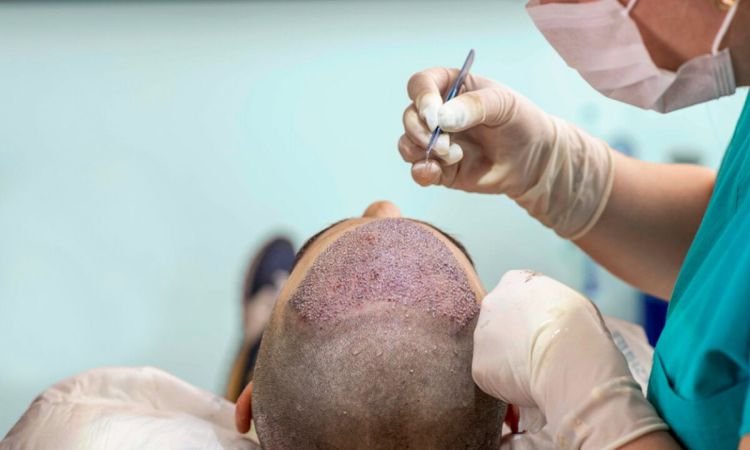 It’s likely that if you’re looking into hair transplant operations, you want to know how to maximize the outcomes of your procedure. We have put together these suggestions on how to make the most of each step in the process, from finding a qualified surgeon and team that will meet your needs, all the way through postoperative care and follow-up appointments. We understand how crucial it is for a person to leave a surgical setting feeling confident and satisfied with their outcomes. You’ll offer yourself the best chance of having successful transplant results while reducing risks by making the necessary plans and preparations before surgery, receiving continued care after discharge, and following our advised instructions below. Continue reading to find out more!
It’s likely that if you’re looking into hair transplant operations, you want to know how to maximize the outcomes of your procedure. We have put together these suggestions on how to make the most of each step in the process, from finding a qualified surgeon and team that will meet your needs, all the way through postoperative care and follow-up appointments. We understand how crucial it is for a person to leave a surgical setting feeling confident and satisfied with their outcomes. You’ll offer yourself the best chance of having successful transplant results while reducing risks by making the necessary plans and preparations before surgery, receiving continued care after discharge, and following our advised instructions below. Continue reading to find out more!
1. Do Your Research
The key to a successful hair transplant is finding a reputable and skilled facility or physician. Because of this, research is crucial. There are many tools online that make this procedure simple. Research several clinics and doctors, read evaluations of their methods, and compare pricing. In order to obtain a sense of the outcomes they had, it might be good to chat with previous clients who underwent comparable treatments at the same facility or with the same doctor. In order to guarantee the best outcomes, the doctor should also be well-versed in contemporary treatments and equipped with the most recent technologies. Furthermore, the hair transplant clinic or doctor’s staff should be professional and knowledgeable and have a good reputation in the market.
2. Be Realistic About Your Expectations
 It’s crucial to have reasonable expectations for the outcomes of your hair transplant. Make sure you are informed of any potential hazards or issues that might develop, as well as the procedures’ restrictions. For instance, not everyone can have a complete head of hair since their hair loss may be too severe or they may not have enough donor hairs available. As a result, it may take several sessions to get the desired results in these cases. Additionally, even though the hairs that were transplanted are permanent, they will gradually lose density as we age naturally. It’s imperative that you become acquainted with these realities before continuing.
It’s crucial to have reasonable expectations for the outcomes of your hair transplant. Make sure you are informed of any potential hazards or issues that might develop, as well as the procedures’ restrictions. For instance, not everyone can have a complete head of hair since their hair loss may be too severe or they may not have enough donor hairs available. As a result, it may take several sessions to get the desired results in these cases. Additionally, even though the hairs that were transplanted are permanent, they will gradually lose density as we age naturally. It’s imperative that you become acquainted with these realities before continuing.
3. Ask Questions
Ask a ton of questions before making any choices! You’ll be more equipped for surgery day if you are as knowledgeable as possible about the entire procedure from beginning to end. You should make sure to enquire about any potential adverse effects and the type of anesthetic your doctor intends to utilize from your doctor. You should also find out how long the surgery will last, what the postoperative care guidelines are, and whether there are any additional fees or expenditures related to it. Additionally, the physician should be able to go through the best practices for achieving the best hair transplant results, as well as any potential drawbacks.
4. Find a Qualified Surgeon and Team
 When getting a hair transplant, it’s crucial to work with a skilled surgeon and medical staff you can put your faith in. Although anybody may conduct these procedures, not everyone does it with the same amount of skill or experience. Make sure to look into the qualifications of the surgeon and compare the before-and-after outcomes of previous patients. Inquire about their capacity to accommodate any additional issues you may have, such as follow-up appointments.
When getting a hair transplant, it’s crucial to work with a skilled surgeon and medical staff you can put your faith in. Although anybody may conduct these procedures, not everyone does it with the same amount of skill or experience. Make sure to look into the qualifications of the surgeon and compare the before-and-after outcomes of previous patients. Inquire about their capacity to accommodate any additional issues you may have, such as follow-up appointments.
5. Prepare for Surgery Day
Make sure you have a good night’s sleep and are aware of what to anticipate in order to be ready for the big day. To ensure that you are well informed and at ease with the treatment, ask the surgeon any questions you may have. If you can, arrange for someone to pick you up from the clinic to hasten your recuperation. Numerous folks make the error of underestimating how long recuperation may take. Additionally, during the surgery, maintain as much calm as you can while according to your surgeon’s instructions. It’s crucial to be aware that you can have some discomfort while the hair is being transplanted, but this should pass immediately after the procedure is over.
6. Follow Instructions Carefully
 Once you leave the surgical center, make sure to carefully follow all of your doctor’s recommendations since doing so will help you get the best possible hair transplant outcomes. It’s crucial to keep in mind not to touch or scratch your freshly transplanted hair and to refrain from engaging in specific activities like swimming, strenuous exercise, and tanning. Additionally, take the medication as directed by your physician to avoid an infection and swelling.
Once you leave the surgical center, make sure to carefully follow all of your doctor’s recommendations since doing so will help you get the best possible hair transplant outcomes. It’s crucial to keep in mind not to touch or scratch your freshly transplanted hair and to refrain from engaging in specific activities like swimming, strenuous exercise, and tanning. Additionally, take the medication as directed by your physician to avoid an infection and swelling.
7. Postoperative Care and Follow-Up Appointments
You must strictly adhere to your surgeon’s postoperative care guidelines. This will enable the best possible healing of the surgical areas while assisting in risk reduction. Keep all of your follow-up appointments as well so that you may talk to your doctor right away if you have any concerns or questions after your surgery. Months following the hair transplant process, a patient will frequently need further follow-up sessions to assess the outcomes and talk about potential touch-ups.
8. Keep Your Head Elevated During The Healing Process
 In order to minimize edema, it is typically advised to elevate the head. One way to do this is to use a pillow as a support while you sleep, or even two pillows in place of one. You will recover more quickly and with fewer issues if you keep your head up to prevent fluid from collecting around the donor and recipient sites. The additional support can also aid in easing pain and facilitating sleep.
In order to minimize edema, it is typically advised to elevate the head. One way to do this is to use a pillow as a support while you sleep, or even two pillows in place of one. You will recover more quickly and with fewer issues if you keep your head up to prevent fluid from collecting around the donor and recipient sites. The additional support can also aid in easing pain and facilitating sleep.
9. Avoid Scratching the Recipient Site
Never scrape the area of the scalp where the grafts are since doing so might damage the grafts, limit their ability to develop, or result in a decrease in the density of the hair. Because it’s crucial for success that the freshly transplanted hairs remain intact at their new homes on your scalp, you’ll need to exercise particular caution during the healing process. To preserve positive outcomes, make an effort to refrain from scratching, rubbing, or tugging the grafts.
Conclusion
In conclusion, the aforementioned advice is crucial for achieving the best hair transplant results. But remember that success is not a certainty if you use their advice. In the end, it’s crucial to pick a respected surgeon and adhere to their postoperative advice to guarantee successful outcomes from your hair transplant procedure.




